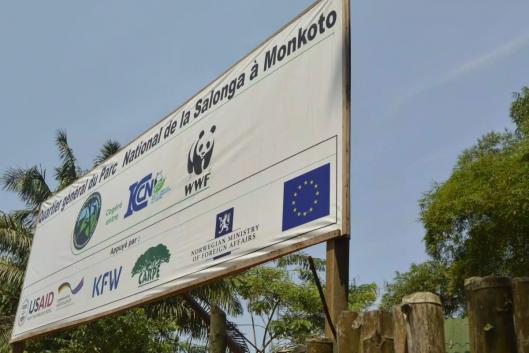Serious abuses in DRC’s Salonga National Park at the hands of park rangers supported by funding from the WWF and a range of international donors are just the latest to be documented. This is a wider problem on human rights abuses and colonial interventions in tropical forests.
An investigation by the organization Rainforest Foundation UK found that communities living around the Salonga National Park in the Democratic Republic of Congo have been subjected to torture, murder and gang-rape at the hands of park rangers supported by funding from the WWF and a range of international donors.
The investigation reports serious incidents, including, two cases of gang-rape, two extra-judicial killings, and multiple accounts of torture and other forms of mistreatment committed by park guards.
The World Wide Fund for Nature (WWF) started working in Salonga National Park, a UNESCO World Heritage Site, in 2004. Since 2015, WWF has been responsible for the park’s management.
About 700 communities live around the park, including an estimated 130,000 people living in a “corridor” between the two separate halves of the park. When the park was established in 1970, many of these communities were evicted from the park and banned from accessing their ancestral forests, which they depend on for survival. These communities report widespread malnutrition, which they overwhelmingly attribute to conservation-related restrictions on traditional hunting and fishing activities.
Conservation measures have become increasingly militarised in recent years. Anti-poaching initiatives are run by the Congolese protected areas authority (ICCN - Institut Congolais pour la Conservation de la Nature), sometimes in collaboration with the Congolese army, on top of the approximately 300 eco-guards that are employed at Salonga National Park.
“It is common for women who venture into the park to be raped, and men face extortion and torture,” said one villager living on the park’s boundary to the investigation team.
WWF and the German Development Bank
In May and October 2018, Rainforest Foundation UK informed WWF and KfW, the German Development Bank – one of Salonga National Park’s funders, about the alleged human rights abuses. In January 2019, WWF agreed to commission an investigation into the case of abuse in Salonga National Park.
In February 2019, the investigation confirmed the murder of three men, the rape of six women, and the torture of three men by eco-guards between 2002 and 2016. However, even though it was not agreed that the report would be confidential, WWF told Rainforest Foundation UK that it will not make the investigation available, except under conditions of strict confidentiality.
Simon Counsell, Executive Director of Rainforest Foundation UK said: “Shocking though these reports are, we fear that the real extent of the atrocities could be much greater. In just two areas near Salonga, interviews with over 230 local people showed that a quarter of them reported being the victims of some kind of abuse. WWF needs to make the reports of its latest investigation available, to publicly acknowledge what has happened in Salonga, and publicly commit to helping the victims and ensuring that such abuses and harm to local communities will not happen again.”
At the same time, journalists at BuzzFeed News, who have reported on widespread abuses around National Parks supported by WWF across Africa and Asia, have taken out a legal case to get KfW to release documents about correspondence related to the development bank's funding of Salonga National Park. BuzzFeed News wants to know when KfW, and the German government, found out about the serious human rights violations and how it dealt with them. So far, KfW has provided 5.4 million euros (around US6 million dollars) for management of Salonga National Park.
“It’s about control”
In 2015, a WWF employee was named the park’s top official, in charge of hundreds of eco-guards. After he left the job, in an interview with Nomad magazine, he said about the communities living in Salonga National Park, “I spent my first five days on a dug-out canoe visiting various sectors of the park. The deeper you get, the more isolated and undeveloped it gets. There’s a heavy-handed police presence. I went to a very isolated village, where a contingent of police greeted me in full riot gear, with rocket launchers. It was very intimidating. It’s about control. There were always stories of extortion, theft, rape and beatings. They were a law unto themselves, as were the Congolese army assigned to the park to control poaching. They did a good job reducing poaching, but in a rather heavy-handed way”. (1)
Unfortunately, the abuses in Salonga National Park are just the latest to be documented by the Rainforest Foundation UK and Buzzfeed News. This is definitely just the surface of a wider problem on human rights abuses and colonial interventions in tropical forests. Conservation organisations are too often at the centre of these serious abuses.
(1) NOMAD, Accidents happen in Congo, August 2017
This article was written based on the following materials:
- Rainforest Foundation UK, Widespread Human RightsAbuses in Africa’s largest Forest Park, March 2019
- Rainforest Foundation UK, RFUK calls on WWF to immediately reléase details of investiagtion onto human rights abuses, April 2019
- Buzzfeed News, Part I: WWF’s Secret War; Part II: Internal reports shows WWF was warned years ago of “frightening” abuses; and Part III: WWF says Indigenous People want this park but and internal report reveals fears of ranger “repression”, March 2019
- REDD-Monitor, “Torture, murder, rape”: WWF must release its report about abuses carried out by eco-guards in Salonga National Park
